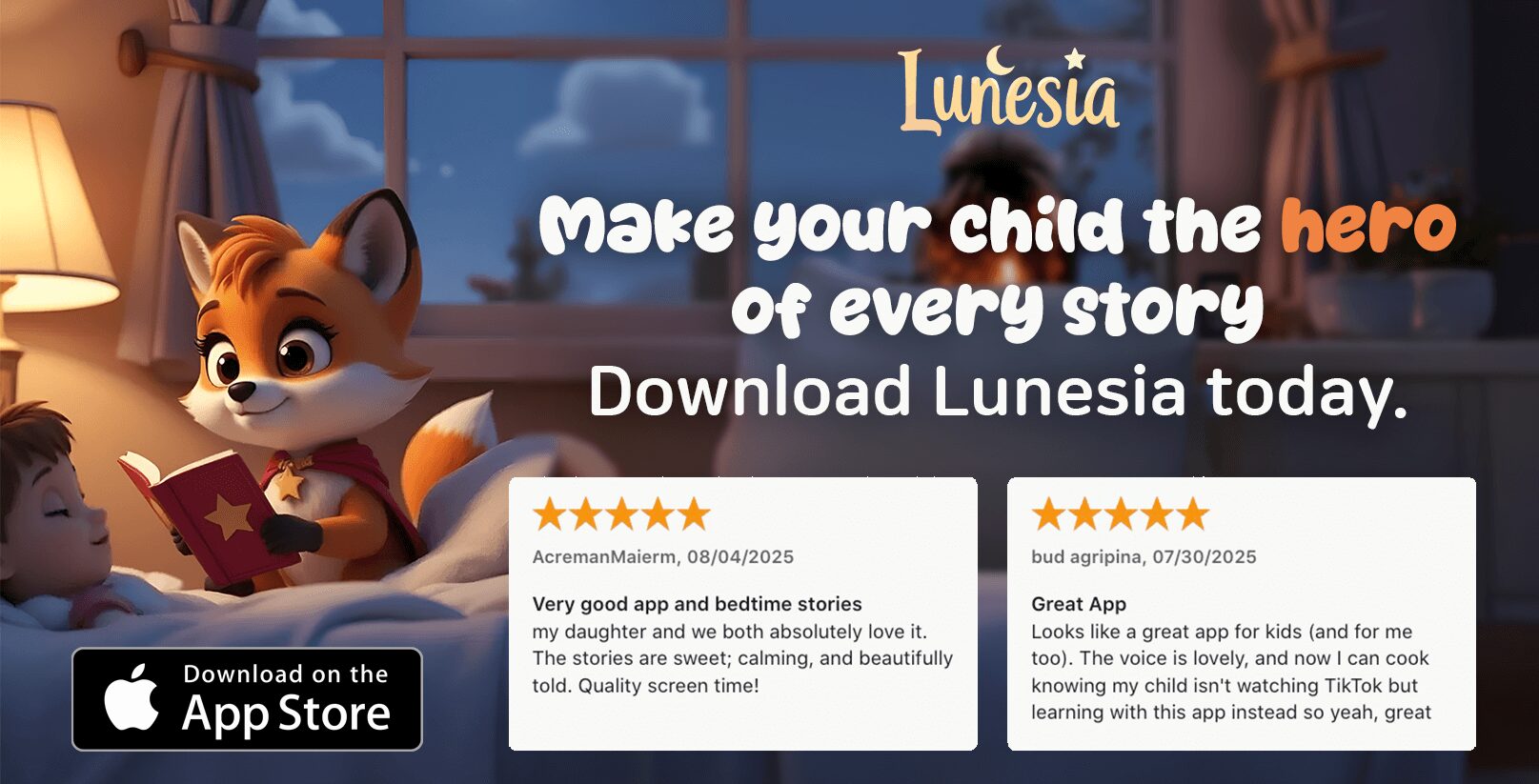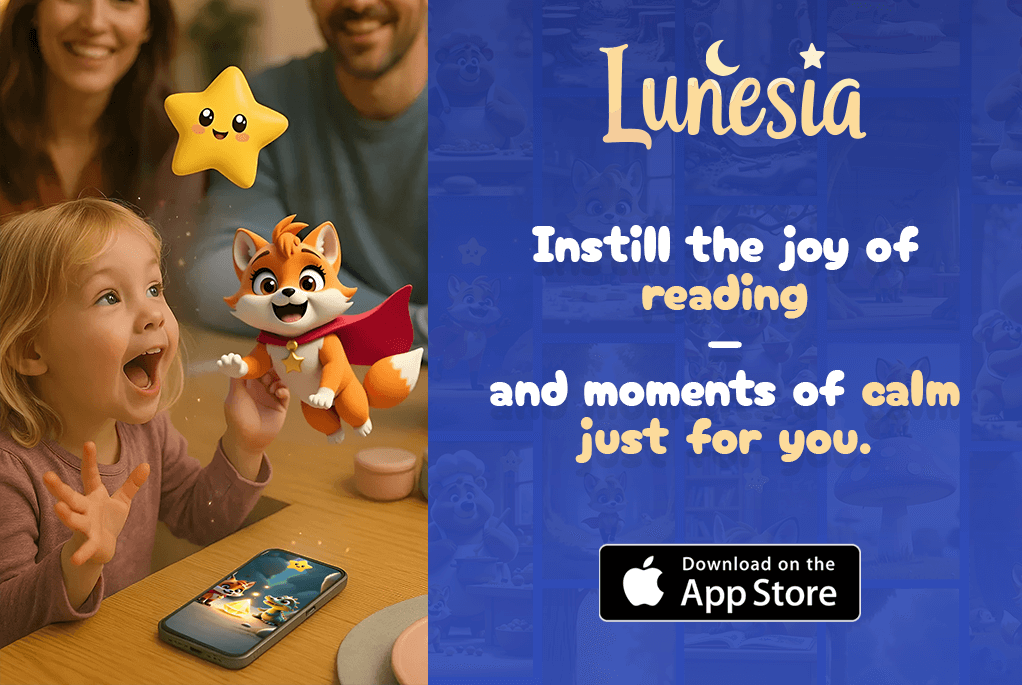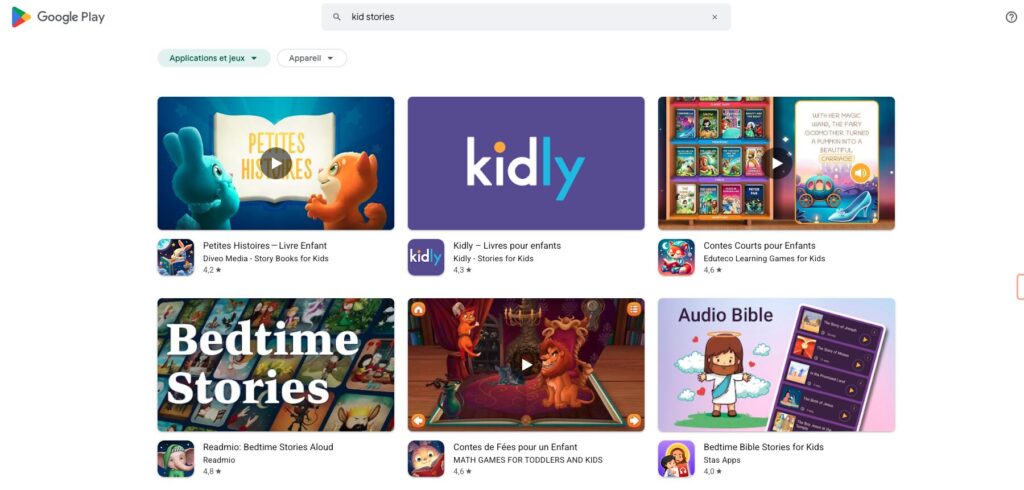As a parent and educator, I’ve seen firsthand how children’s emotional intelligence can impact their daily lives. In today’s digital world, story apps have emerged as a valuable tool to support kids’ emotional development. These apps combine engaging narratives with social-emotional learning (SEL) principles, helping children understand and manage their feelings.
With the growing demand for digital solutions to complement traditional emotional development methods, the market for emotional intelligence apps has expanded. Parents are now turning to these apps to provide their children with the tools they need to navigate their emotions. In this article, we’ll explore two leading contenders: Lunesia and Calm Kids. You can explore more about mindfulness story apps on Lunesia’s website. Let’s dive into what makes these apps effective and which one might be the best fit for your child.
The Power of Digital Storytelling for Emotional Development
In today’s digital age, storytelling is becoming a powerful tool for fostering emotional intelligence in children. As a parent, you’re likely aware of the importance of emotional development in your child’s overall growth. Social-emotional learning (SEL) is crucial for understanding ourselves, our emotions, and the choices we make.
How Stories Help Children Process Emotions
Stories have long been used to help children process complex emotions. Narrative structures create safe spaces for emotional exploration, allowing children to name their feelings and recognize emotional patterns. This develops empathy and crucial emotional intelligence skills.
The Rise of Social-Emotional Learning (SEL) in Digital Formats
The transition to digital formats has enhanced the emotional learning experience. Interactive elements in story apps engage tech-savvy children, making SEL more accessible. These platforms deliver personalized experiences that adapt to a child’s age and developmental stage.
| Benefits of Digital Storytelling | Traditional Storytelling | Digital Storytelling |
|---|---|---|
| Engagement | Static | Interactive |
| Personalization | Limited | High |
| Accessibility | Limited by format | Accessible across devices |
Understanding Story Apps for Emotional Growth
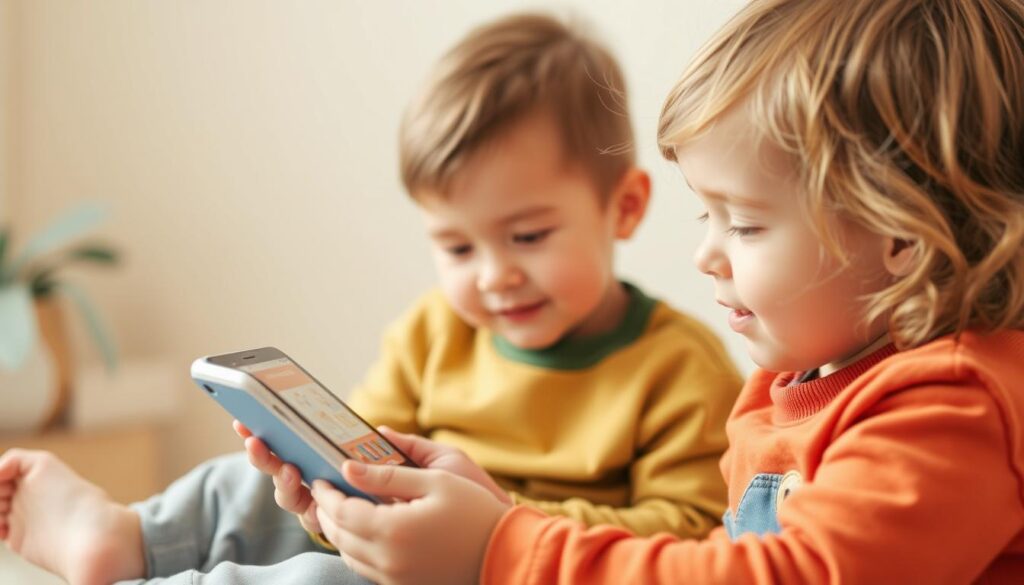
In today’s digital age, story apps have emerged as a valuable tool for supporting children’s emotional growth. These apps leverage the power of storytelling to help kids understand and manage their emotions, developing crucial emotional intelligence skills.
Key Features to Look For in Emotional Growth Apps
When selecting a story app for emotional growth, look for features such as interactive elements, age-appropriate content, and opportunities for parent involvement. High-quality apps incorporate evidence-based approaches to social-emotional learning (SEL) while maintaining an engaging experience for children.
Benefits of Interactive Storytelling for Children
Interactive storytelling offers unique benefits compared to passive media consumption. By actively participating in stories, children strengthen their emotional learning and retention. These apps serve as valuable tools for parents and educators to open conversations about difficult emotions or situations in a non-threatening way. For more insights, you can explore other top-rated story apps on Lunesia’s website.
Lunesia: A Comprehensive Overview
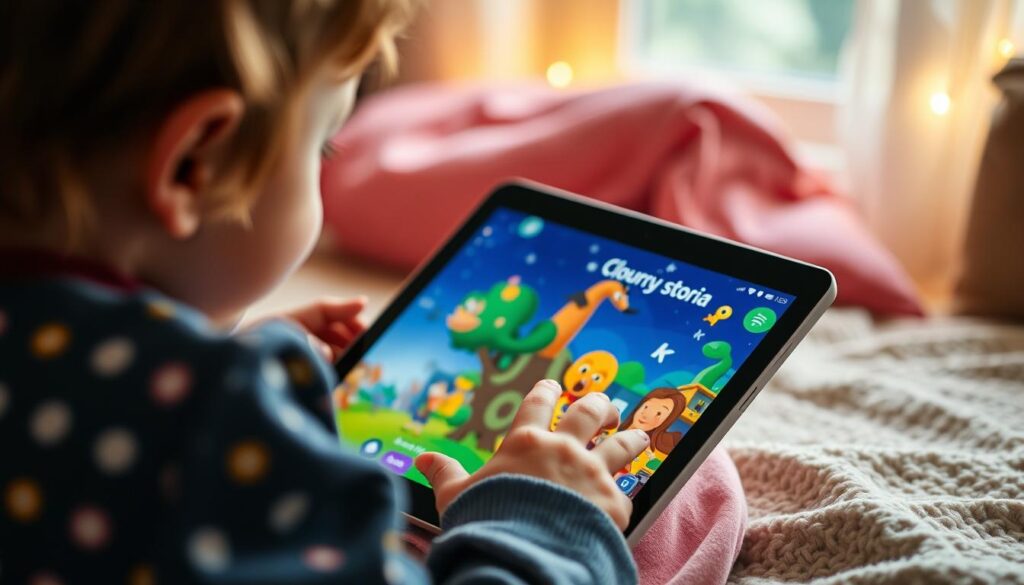
In the realm of digital storytelling, Lunesia stands out as a comprehensive tool for children’s emotional development. As a parent, you’re likely eager to explore how this Lunesia story app for kids can support your child’s growth.
Core Features and Functionality
Lunesia offers a rich library of interactive stories that cater to children’s emotional needs. The app’s core features include a user-friendly interface, engaging narratives, and activities designed to foster emotional intelligence.
Emotional Intelligence Elements
The app specifically targets emotional intelligence development through its content and activities. By using Lunesia, kids can better understand and manage their emotions and feelings, developing essential life skills.
Age Appropriateness and Accessibility
Lunesia is designed to be accessible to children across various developmental stages. The app offers multiple learning paths and is available in different languages, making it a versatile tool for parents seeking to support their child’s emotional growth.
Calm Kids: A Comprehensive Overview

Calm Kids offers a unique approach to helping children navigate their emotions through a combination of meditation, stories, and interactive content. This app is designed to support children’s emotional wellbeing by providing them with the tools they need to manage their feelings effectively.
Core Features and Functionality
The Calm Kids app is equipped with a rich library of stories and meditation exercises tailored for children. Its learning approach is both engaging and educational, making it an excellent tool for parents seeking to support their child’s emotional development. The app’s content is carefully curated to promote social-emotional learning (SEL).
Mindfulness and Emotional Regulation Tools
One of the standout features of Calm Kids is its focus on mindfulness and emotional regulation. The app provides various meditation exercises and activities designed to help children understand and manage their emotions. By using these tools, children can develop better emotional regulation skills, leading to improved mental wellbeing.
Age Appropriateness and Accessibility
Calm Kids is designed to be accessible to children of various ages, with content tailored to different developmental stages. The app is user-friendly, making it easy for children and parents to navigate. By considering the age and needs of the child, Calm Kids provides a personalized experience that supports emotional growth.
Head-to-Head Comparison: Lunesia vs. Calm Kids
When it comes to choosing the right app for your child’s emotional growth, a direct comparison between Lunesia and Calm Kids can be incredibly insightful. Let’s dive into the specifics of what each app offers.
User Interface and Experience
Lunesia and Calm Kids both offer intuitive interfaces designed for young children. Lunesia’s interface is visually appealing with engaging animations, while Calm Kids focuses on simplicity and ease of navigation. Both apps provide a seamless experience for kids, but Lunesia’s design is slightly more engaging.
Content Quality and Variety
Lunesia boasts a diverse library of stories that cater to various emotional themes, while Calm Kids offers a range of guided meditations and activities. Lunesia’s content is more varied, with new stories added regularly, whereas Calm Kids focuses on depth with its mindfulness exercises.
Pricing and Subscription Options
| Features | Lunesia | Calm Kids |
|---|---|---|
| Monthly Subscription | $9.99 | $8.99 |
| Annual Subscription | $99.99 | $89.99 |
| Free Trial | Yes | Yes |
Lunesia and Calm Kids offer competitive pricing with options for monthly and annual subscriptions. Both provide a free trial, allowing parents to test before committing.
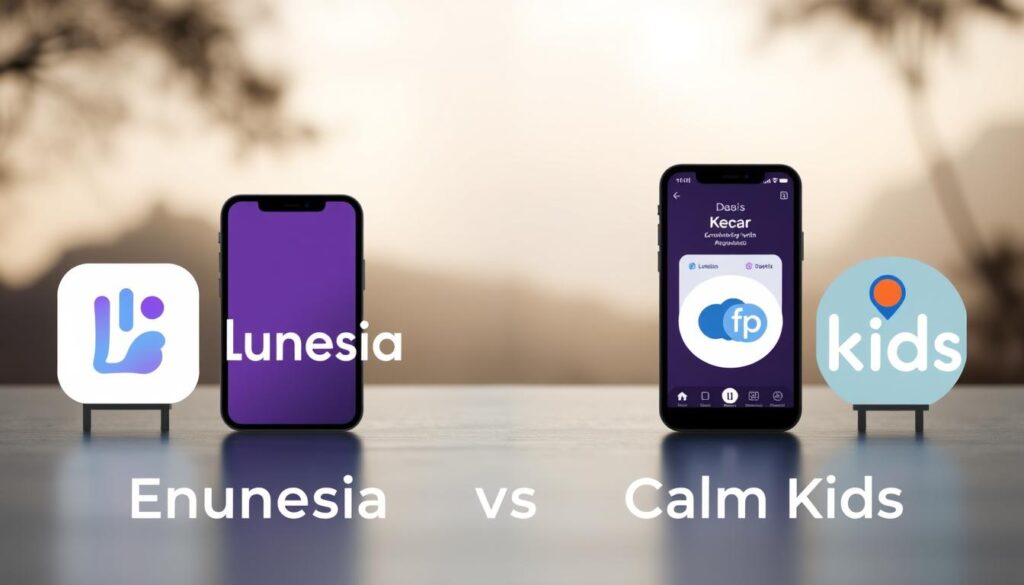
Daniel Tiger’s Grr-ific Feelings
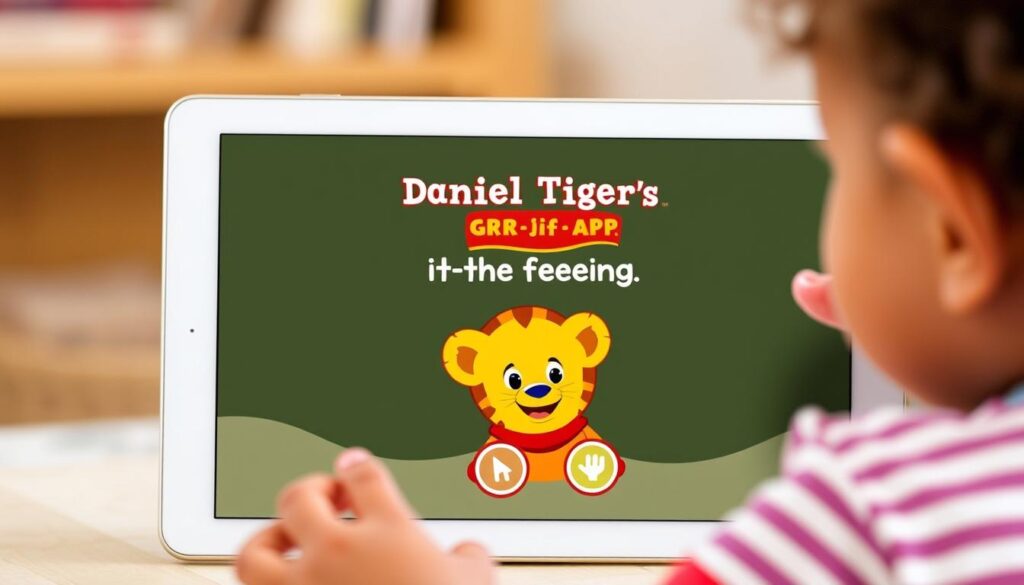
PBS Kids has once again created an engaging tool with Daniel Tiger’s Grr-ific Feelings to support children’s emotional growth. This app is designed to help children understand and manage their emotions through interactive stories and activities featuring beloved characters from the Daniel Tiger’s Neighborhood series.
How It Helps Children Express Emotions
Daniel Tiger’s Grr-ific Feelings helps kids identify and express their emotions through a character-driven approach. The app’s interactive stories and songs teach children how to calm down when angry, celebrate proud moments, and relax with music and activities. By using familiar PBS characters, the app makes learning emotional regulation strategies fun and accessible.
Best Features for Parents and Educators
The app includes valuable resources for parents and educators, such as lesson plans and activity suggestions, to reinforce emotional learning in both home and classroom settings. These resources help adults support children in applying the emotional regulation strategies they’ve learned through the app. The connection to the Daniel Tiger’s Neighborhood television series also provides a comprehensive learning experience.
Overall, Daniel Tiger’s Grr-ific Feelings is an excellent addition to any child’s emotional learning journey, offering a engaging and effective way to develop essential life skills.
Breathe, Think, Do with Sesame
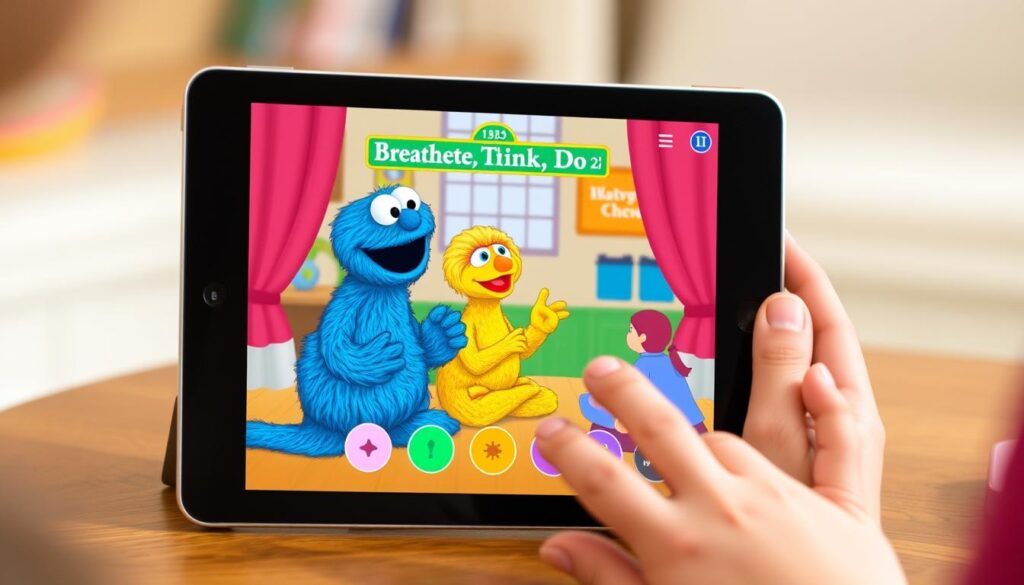
For parents seeking effective ways to help their children manage anxiety and anger, Breathe, Think, Do with Sesame is a highly recommended app. This Sesame Street app teaches young kids how to keep calm and carry on, supporting them in managing anxieties and anger issues.
Problem-Solving Strategies for Young Children
The app employs a simple, three-step approach: breathe, think, do. This method provides children with a concrete framework for managing difficult emotions and situations. By using familiar Sesame Street characters, the app creates an engaging environment for learning emotional regulation skills.
Parent Resources and Implementation Tips
The app includes a parent resources section that supports adults in reinforcing the breathing and problem-solving techniques in everyday situations. Implementation tips are also provided for both parents and educators, making it easy to integrate the app into classroom settings or home routines for emotional development.
Zoy: The Storybook App for Social-Emotional Learning

Discover Zoy, a pioneering storybook app designed to foster social-emotional learning in children through engaging tales and interactive activities. Zoy provides a safe and nurturing environment where kids can develop essential emotional skills while having fun.
Unique Approach to Emotional Intelligence
Zoy’s storytelling method stands out for its balance of entertainment and educational value. By incorporating emotional intelligence concepts into its stories and activities, Zoy makes abstract emotional concepts accessible to young children. The app’s “Calm Corner” feature offers relaxation stories from certified clinical hypnotherapists, helping kids manage stress and anxiety.
Supplementary Resources for Parents
Zoy’s Empowerment Toolkit is a comprehensive resource for parents, including an SEL guide, interactive workbooks, journals, and engaging coloring books. These resources support children’s emotional and creative development, extending the learning experience beyond screen time into family activities and discussions.
By providing a holistic approach to emotional development, Zoy creates a supportive ecosystem for children to grow and thrive. With its expert-backed approach and engaging content, Zoy is an invaluable tool for parents seeking to nurture their child’s emotional intelligence.
Other Notable Story Apps Supporting Emotional Growth
Several other story apps are worth mentioning for their unique methods of promoting emotional intelligence in children. These apps offer diverse approaches to supporting emotional growth, catering to different age groups and learning needs.
Mindful Powers
Mindful Powers combines storytelling with meditation to help children develop mindfulness skills and emotional awareness. The app offers meditation lessons and visual timers as supplemental activities for introducing SEL skills.

Emotional ABCs Classroom
The Emotional ABCs Classroom app provides a structured approach to teaching emotion identification, regulation, and social relationships through interactive lessons. It’s an excellent program for young children.
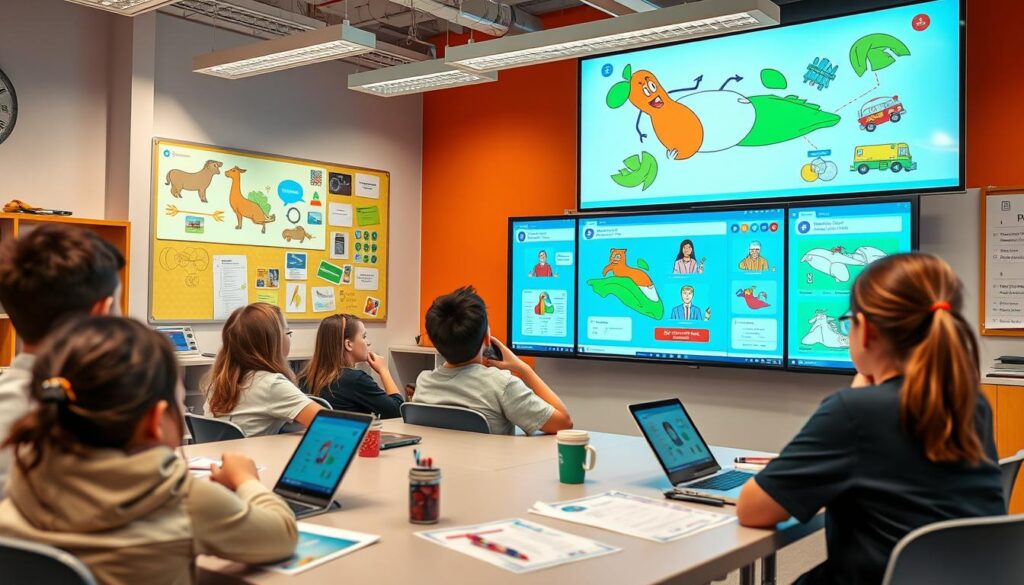
Touch and Learn – Emotions
Touch and Learn – Emotions bridges the gap between feeling emotions and developing the vocabulary to express them. This app is particularly valuable for younger children, helping them articulate their feelings.
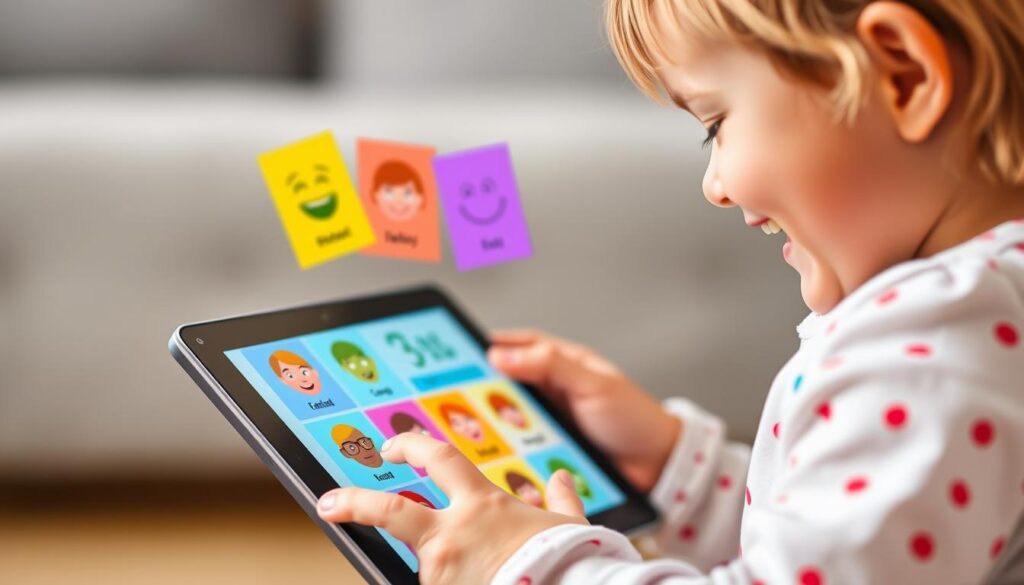
These apps offer a range of approaches to supporting emotional growth, from meditation and mindfulness to interactive lessons and emotional vocabulary building. By exploring these options, parents can find the best fit for their child’s specific needs.
How to Choose the Right Emotional Growth App for Your Child
The journey to finding the ideal emotional growth app for your child begins with understanding their unique needs and developmental stage. To make an informed decision, consider factors such as your child’s age, specific emotional challenges, and the type of content that engages them. Evaluating these aspects will help you narrow down the options and choose an app that supports their emotional growth effectively.
Considering Your Child’s Age and Developmental Stage
When choosing an emotional growth app, it’s crucial to consider your child’s age and developmental stage. Different apps cater to different age groups, offering content that’s appropriate for their level of understanding and emotional maturity. For instance, preschoolers benefit from simple, interactive stories, while older children can engage with more complex lessons.
Aligning App Features with Your Child’s Specific Needs
To maximize the benefits of an emotional growth app, align its features with your child’s specific needs. Whether your child struggles with anxiety, anger, or empathy, select an app that offers targeted SEL lessons and activities. This tailored approach ensures that the app provides relevant support for your child’s emotional development.
- Evaluate your child’s emotional development needs.
- Consider the app’s content quality and variety.
- Assess the app’s user interface and experience.
- Look for apps that offer personalized learning paths.
- Ensure the app is suitable for your child’s age group.
Conclusion
In today’s digital landscape, the role of story apps in fostering emotional intelligence cannot be overstated. As we’ve explored, apps like Lunesia and Calm Kids offer unique approaches to supporting children’s emotional growth. While both apps have their strengths, the best choice ultimately depends on your child’s individual needs and learning style.
It’s essential to remember that digital tools are most effective when used as part of a broader approach to emotional development. By combining these apps with real-world conversations and experiences, you can create a comprehensive learning environment for your child. Story apps like Daniel Tiger’s Grr-ific Feelings and others can be valuable additions to your parenting toolkit, helping you raise emotionally intelligent and resilient children.
As you navigate the world of emotional learning apps, consider your child’s unique character and experiences. By doing so, you’ll be able to create meaningful moments for your family to connect around emotional topics, fostering a deeper understanding and stronger bonds. I encourage you to explore these tools and discover how they can support your child’s emotional journey.
FAQ
What is the ideal age range for using emotional intelligence apps like Daniel Tiger’s Grr-ific Feelings?
Daniel Tiger’s Grr-ific Feelings is designed for preschoolers, typically between the ages of 2 and 6 years old, to help them develop social-emotional skills.
How do I know if an emotional growth app is suitable for my child’s specific needs?
To determine if an app is suitable, consider your child’s age, developmental stage, and specific needs. Look for apps that offer features aligned with their requirements, such as mindfulness tools or emotional regulation strategies.
Are there any free emotional intelligence apps available for kids?
Yes, some apps offer free versions or trials, allowing you to test their content and features before committing to a subscription. You can explore options like Zoy or Breathe, Think, Do with Sesame.
Can emotional growth apps replace traditional teaching methods?
No, emotional intelligence apps should supplement traditional teaching methods, not replace them. They can be a valuable tool for parents and educators to support children’s emotional development.
How often should my child use an emotional intelligence app?
The frequency of use depends on your child’s individual needs and the app’s design. Some apps, like Calm Kids, recommend regular use, while others, like Daniel Tiger’s Grr-ific Feelings, can be used as needed.
Can I track my child’s progress with emotional growth apps?
Many emotional intelligence apps, such as Lunesia, offer progress tracking features, allowing you to monitor your child’s development and adjust the app’s settings accordingly.

